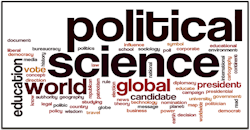Over the past nine years, I have frequently addressed climate change in this column. And there have always been readers who disagreed with my premises or conclusions, although I have always tried to base them on the best available current science.
On at least one occasion, I was prompted to call out those who completely denied any human contribution to climate change. I even went so far as – in some cases – comparing climate change deniers to flat earthers.
Now, after weeks of being deluged with political nonsense in every media (phone, text, print, TV), I’ve concluded that it’s not just the climate change deniers that are ignoring the science. The accepted conservative position on climate change has, for the most part, been to minimize or dismiss the issue. Even some conservative Christian politicians have, surprisingly, ridiculed climate change science. I say surprisingly because there is a biblical calling for us to be good stewards of the earth.
Remarkably, I have received comments from professional engineers (in one case, a PhD) who actually believed (or claimed to believe) that climate change was entirely a left-wing hoax. When shown the satellite photos of the melting glaciers, they espouse conspiracy theories about NASA and NOAA colluding to "photo shop" the evidence. Kind of reminds me of the story of the Moon landings being staged in the Astrodome. However, it’s still much easier to dismiss these clueless folks than it is to dismiss some elitist liberals who totally miss the mark.
Those liberal politicians who have also ignored the science when they thought it would further their agendas have, I believe, damaged the cause more than the deniers. Probably the most egregious of those was the so-called Green New Deal first proposed by a certain NY congresswoman who is commonly referred to only by her initials. Since then, we’ve heard from a number of uber-liberal politicians about the need to stop eating red meat (actually, there are many cardiologists who agree with that, but not because cow farts will irreparably damage the atmosphere), stop traveling (unless they’re flying to their own campaign stop or a boondoggle), and stop using energy that isn’t provided from renewable sources.
On that last note, one of the most contentious climate change issues facing politicians today is the issue of electrification.
Many politicians have committed to eliminating fossil fuels in order to decarbonize. Unfortunately, they don’t understand that (according to the U.S. Energy Information Administration) only 20% of U.S. electricity came from renewable sources last year. They also don’t understand site-to-source ratio, the amount of energy used onsite compared to the amount of energy consumed at the source, which according to Energy Star is presently 2.8:1. In other words, for every kWh used, there are 2.8 kWh produced at the source. That’s 2.4 lb of CO2 emissions!
Believe me, I am all for reducing our dependence on fossil fuels, but not at the expense of increasing our carbon emissions. And even if all of our grid power was produced by renewable sources, the infrastructure today couldn’t handle total electrification, and would crash.
All that being said, there actually was one potential bright spot nationally this year: inclusion of climate change elements in the new Inflation Reduction Act (IRA), signed into law in August. It provides for an estimated $369 billion to be spent on Energy Security and Climate Change, with the goal of reducing carbon emissions by approximately 40% by 2030. The IRA is expected to drive the research and development of low-carbon materials and clean technologies, and to increase the growth of renewable energy through direct funding and tax credits.
All those developments will help, but they won't do enough.
Climate change is probably the most serious issue facing the country (and the planet) on which all politicians could and should be on the same side. All they have to do is stop politicking and really follow the science.
A regular contributor to HPAC Engineering and a member of its editorial advisory board, the author is a principal at Sustainable Performance Solutions LLC, a south Florida-based engineering firm focusing on energy and sustainability. He can be reached at [email protected].
About the Author
Larry Clark
A member of HPAC Engineering’s Editorial Advisory Board, Lawrence (Larry) Clark, QCxP, GGP, LEED AP+, is principal of Sustainable Performance Solutions LLC, a South Florida-based engineering firm focused on energy and sustainability consulting. He has more than two dozen published articles on HVAC- and energy-related topics to his credit and frequently lectures on green-building best practices, central-energy-plant optimization, and demand-controlled ventilation.
